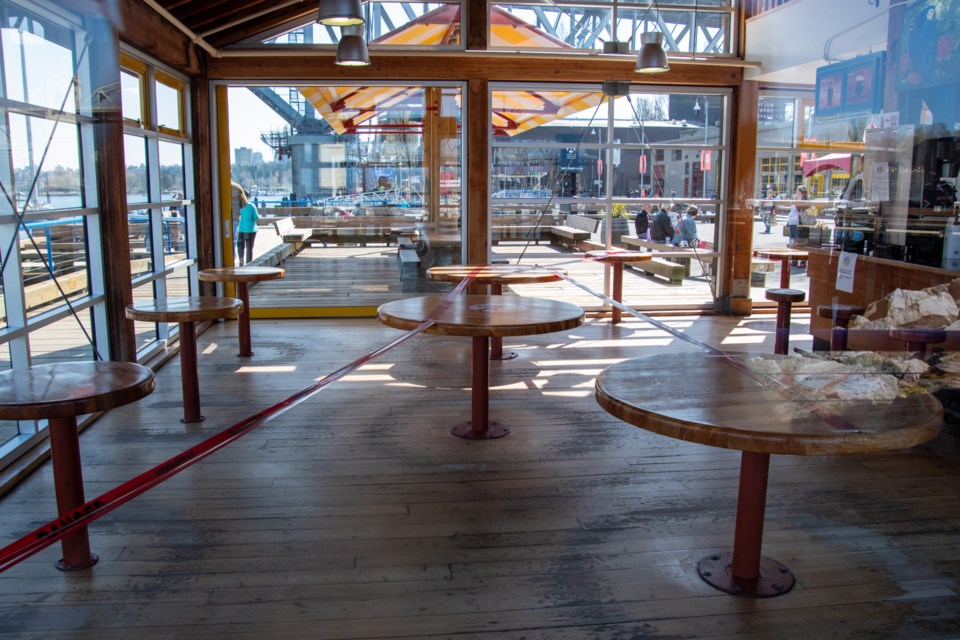B.C. restaurants remain frustrated with Provincial Health Officer Dr. Bonnie Henry for her last-minute decision to order an early last-call on alcohol sales New Year’s Eve.
A group of Vancouver-based restaurants signed an open letter this week demanding Henry apologize for capping liquor sales at 8 p.m. Dec. 31, with barely a day’s notice and zero public consultation.
The move, they said, led to confusion and anger from customers and cost the industry potentially hundreds of thousands of dollars in lost revenue.
Henry has defended her order, saying it was made to stop people drinking too much on New Year’s Eve and potentially spreading COVID-19 during a fragile time in which B.C.’s daily case numbers are precariously high.
Lost in the back-and-forth between Dr. Henry and disgruntled restaurateurs is the real lesson from New Year’s Eve: The B.C. government needs better, more flexible, COVID-19 aid programs to help out sectors getting hammered by double public health restrictions.
The province is funnelling extraordinary amounts of money out the door this year in pandemic assistance.
In December, it pushed $2 billion in extra aid through the legislature, putting more than $7.04 billion on the table in services, rent supplements, income and disability top-ups, tax deferrals and other emergency financial relief in the current fiscal year.
And yet, virtually none of that was money B.C.’s restaurants could access on Jan. 2.
It can’t be used to compensate for lost New Year’s seatings or reservations. It doesn’t cover wasted food or alcohol. And it can’t easily or quickly pay the lost wages and tips for servers who saw a much-anticipated evening of earnings get sideswiped through no fault of their own.
That’s because virtually all the government money is tied up in tightly-prescribed programs, with rigid application rules and criteria.
The province’s marquee aid program for most businesses is the Small and Medium-Sized Business Recovery Grant, which can pay out between $10,000 to $30,000 (with extra amounts for tourism businesses).
Generally, the business community, and the restaurant sector, is happy with its structure.
But you can only apply once.
So when a new restriction on gatherings, crowd limits, closing times or other health measures sideswipes your particular business with little warning - a business can’t dip back into that well for more money.
It also comes with a host of rules, including set numbers of employees, types of owners, a recorded loss of revenue of up to 30 per cent and a documented viable path to remain open during the pandemic.
Economic Recovery Minister Ravi Kahlon is out listening to the business sector, with the intent of further tweaking government’s programs.
“The B.C. government will continue to listen to feedback from the community and stakeholders, like the Small Business Roundtable, and adjust our response to support businesses as needed,” his ministry said in a statement.
One idea Kahlon should consider is the creation of a “rapid response” fund - a pot of a few million dollars the government could use to offer grants, wage top-ups, and interest-free loans to people and businesses hit with losses when unexpected changes are made to public health orders.
That kind of flexibility would take the heat off Dr. Henry, who as the face of the province’s pandemic response takes a disproportionate amount of criticism for any economic fallout stemming from her decisions.
In reality, mitigating economic harm is not her job. She’s charged with making the best public health decisions, guided on the best science, to minimize deaths during the pandemic.
It’s up to the NDP government of Premier John Horgan to offer the programs and services that compensate for financial hardship inflicted by those rules.
But instead of standing side-by-side with Henry when she announced her New Year’s Eve orders, the premier and his ministers were nowhere to be found. And they had nothing to offer to help.
Meanwhile, the restaurant sector says, despite its initial anger, it has found a common ground with Dr. Henry through subsequent conversations.
“She tried to do what she felt was right,” said Ian Tostenson, president of the B.C. Restaurant and Foodservices Association.
“We’ve had some good chats with the provincial health office,” he added.
“They look at it in terms of public safety and health. They don’t look at it in terms of operations. And they have so much to think about all the time. They felt they didn’t close restaurants, they just stopped the service of alcohol. You could still have food. What they didn’t realize is people like to have a glass of wine or bottle of wine with their meal. And that impacted cancellations.”
Restaurants and Dr. Henry’s office are jointly planning the next few months of major events, including Valentine’s Day, St. Patrick’s Day, Mother’s Day and even the Super Bowl, said Tostenson.
“We’re now going to start looking long-term,” he said. “Chart out the next six to eight months… look at what those events look like in our world, and have a plan A and B.”
Kahlon and other government ministers should also be at that table, armed with new resources in a rapid response fund. That way, the government could offer actual help, when and where it’s actually needed.
Rob Shaw has spent more than 13 years covering BC politics, now reporting for CHEK News and writing for The Orca. He is the co-author of the national best-selling book A Matter of Confidence, and a regular guest on CBC Radio.
SWIM ON:
- As early as March 9 of last year, it was clear COVID-19 would be devastating to businesses across BC.
- Pandemic relief was one of several topics covered in Maclean Kay's year-end interview with Premier John Horgan.
- Sylvain Charlebois wondered how Canadian households will cope with sharply rising grocery bills.



